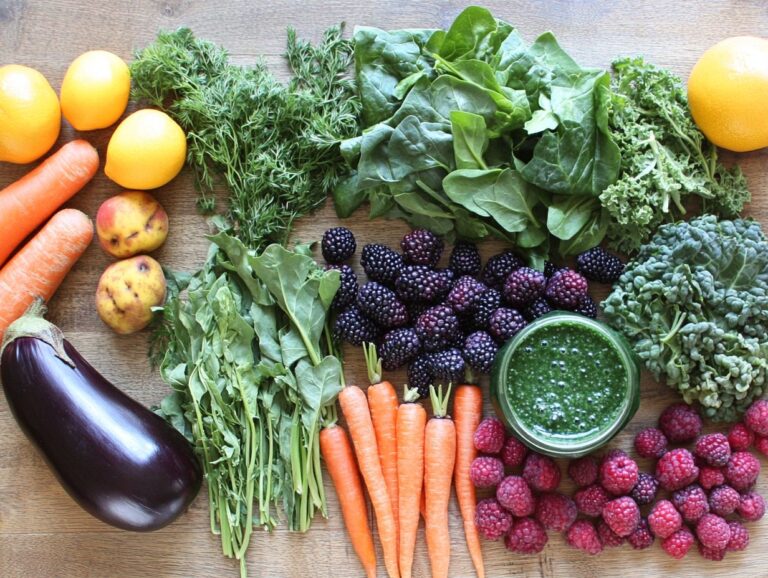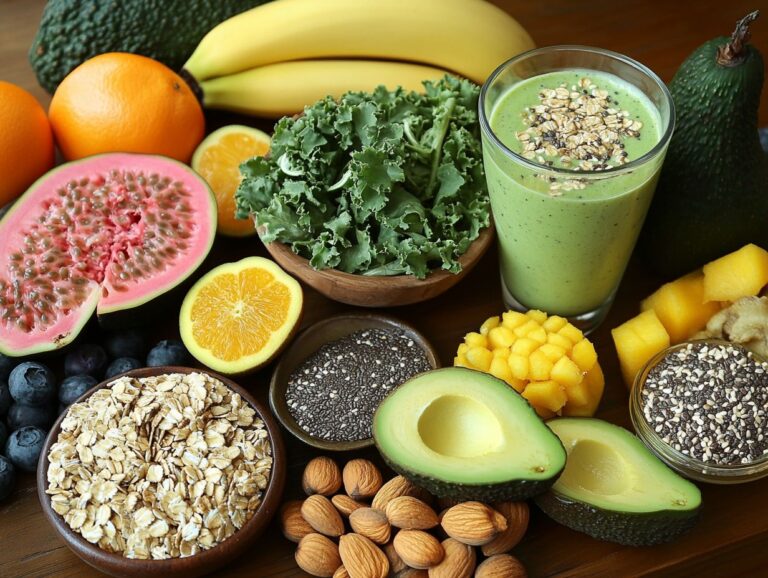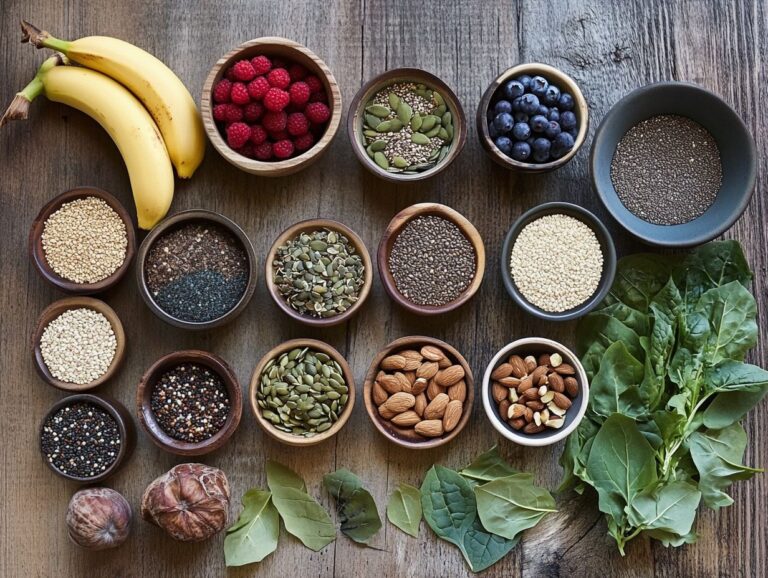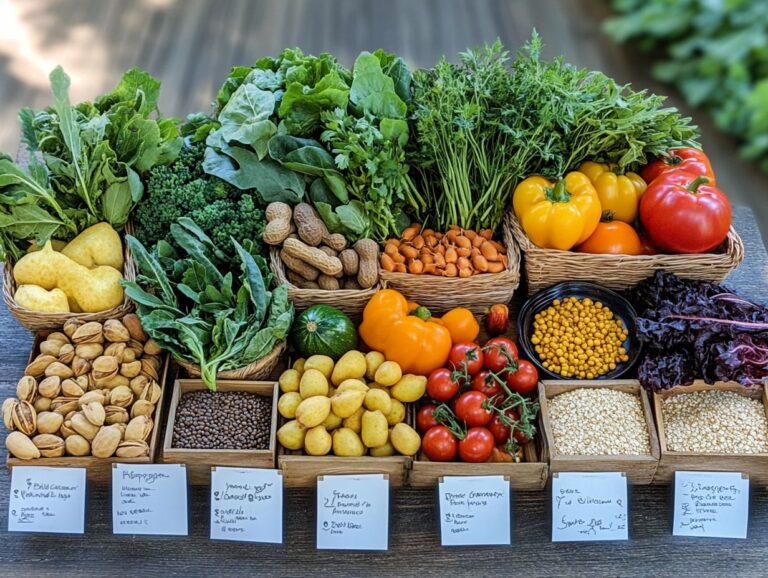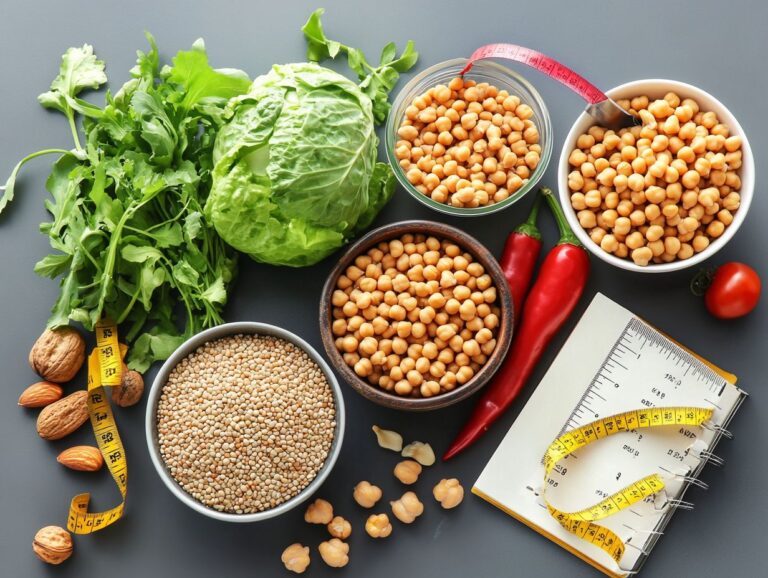A vegan diet can impact the stomach in various ways. Although plant-based eating is generally considered beneficial for health, individuals on high-fiber diets may experience gas and bloating. This article explores the causes of these gastrointestinal issues, including high-fiber foods and certain vegetables that might lead to discomfort. Additionally, it offers tips on what to include and avoid in vegan diets so that individuals can enjoy the health benefits without the bloating.
What Is a Vegan Diet?
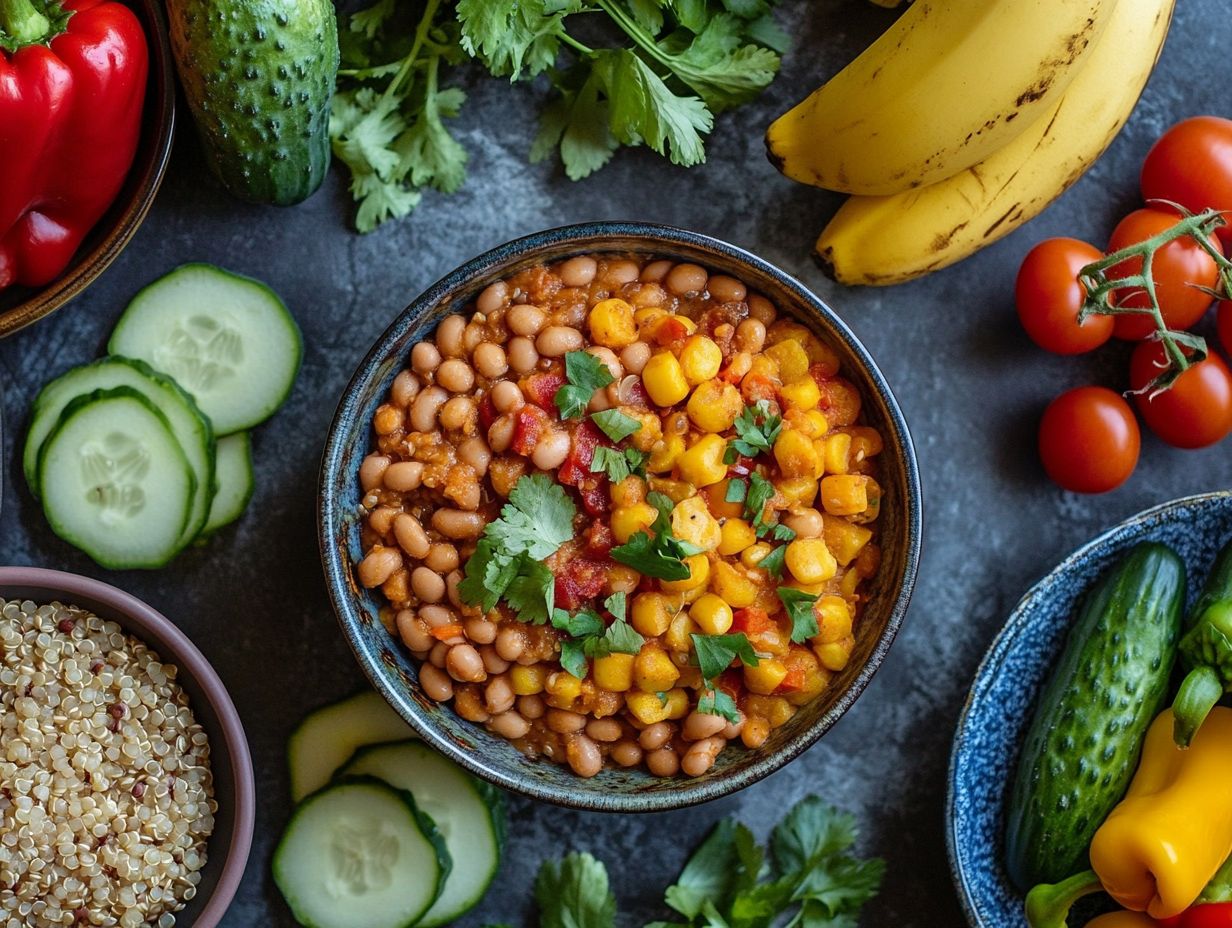
A vegan diet is entirely plant-based and excludes all animal products, including meat, dairy, and eggs. It consists of a variety of foods such as fruits, vegetables, grains, nuts, seeds, and legumes. This plant-based diet often includes dairy alternatives like almond milk and coconut milk and avoids animal proteins.
Vegan diets emphasize whole foods and provide essential nutrients from sources like legumes, healthy grains, and dairy alternatives, including almond milk and coconut milk. Healthy grains such as quinoa and brown rice are also crucial components of a balanced vegan diet.
Adopting a vegan lifestyle can enhance digestive health and may help manage issues such as bloating and gas, especially when appropriate non-gassy foods are chosen and gas-producing ingredients, like high-starch foods or those high in sugar, are avoided.
What Causes Gas and Bloating?
Gas and bloating are common digestive symptoms that can arise from various dietary factors. These factors include the consumption of gassy foods such as beans, broccoli, and high-starch items. For individuals with gluten sensitivity, consuming gluten can lead to increased bloating and discomfort.
When food is poorly digested, it can ferment in the intestine, leading to the production of intestinal gas and resulting in discomfort. Individuals with gluten sensitivity may experience increased bloating after consuming gluten-containing grains, highlighting the importance of understanding how different foods affect digestive health and contribute to gas production. It’s crucial to balance protein sources and adopt low-carbohydrate options to mitigate this issue.
1. High Fiber Foods
High-fiber foods, including whole grains, fruits, and certain vegetables, are essential for digestive health as they improve regularity and reduce constipation. However, consuming these foods in excess may lead to gas and bloating.
When incorporated into a daily diet, fiber-rich foods provide numerous health benefits. They promote digestive health by adding bulk to the digestive system, allowing it to function more efficiently while reducing the risk of digestive disorders.
Foods like oats, quinoa, apples, and legumes contain soluble fiber, which contributes to gut health and helps control cholesterol levels. It is important to gradually increase fiber intake, as a sudden rise can lead to adverse effects such as bloating and increased gas, particularly from beans and cruciferous vegetables like cauliflower. Consuming fruits in moderation and choosing vegetables that are less likely to cause gas can also be beneficial.
By balancing different types of fiber, incorporating probiotics such as probiotic yoghurts, and drinking plenty of water, the negative effects of increasing fiber intake can be minimized while still reaping the positive benefits for overall health.
2. Cruciferous Vegetables
Cruciferous vegetables, such as broccoli, cauliflower, and Brussels sprouts, are highly nutritious but can also be significant sources of gas and bloating due to their fiber content and certain gas-producing compounds like raffinose. Alternatives like spinach and other leafy greens can be less likely to cause bloating and allow for a diet reduced in gas.
While these vegetables are rich in vitamins and minerals, they may cause digestive issues for some individuals, particularly when consumed in large quantities, leading to discomfort associated with intestinal gas.
However, despite these potential digestive drawbacks, the health benefits of cruciferous vegetables are hard to ignore. They are high in antioxidants, support detoxification, and may even possess cancer-fighting properties.
For those who experience discomfort, alternatives like leafy green vegetables such as spinach or romaine can offer similar nutritional benefits with less digestive distress.
Cooking cruciferous vegetables can also alleviate their gassiness, making them easier to digest while still allowing individuals to enjoy their many health advantages.
3. Legumes
Legumes, such as beans, lentils, and peas, are important sources of plant protein and fiber commonly included in a vegan diet. While they are among the highest-fiber foods available, they can also cause gas and bloating due to specific sugars that are difficult to digest. Despite these potential drawbacks, legumes offer numerous health benefits, including improved digestive health. Techniques such as soaking and sprouting can help reduce gas production.
However, it is important to manage portion sizes and preparation methods to minimize discomfort from intestinal gas.
Legumes provide a daily source of essential vitamins and minerals, including iron, potassium, and magnesium, which contribute to overall nutritional intake. For those following a vegan diet, legumes can serve as a vital source of complete protein when combined with whole grains.
To reduce the side effects of gas and bloating, individuals can soak dried legumes for several hours before cooking, as this process helps break down the complex sugars that can cause digestive discomfort. Additionally, cooking legumes thoroughly and gradually introducing them into the diet can help the body adjust to their high fiber content.
4. Artificial Sweeteners
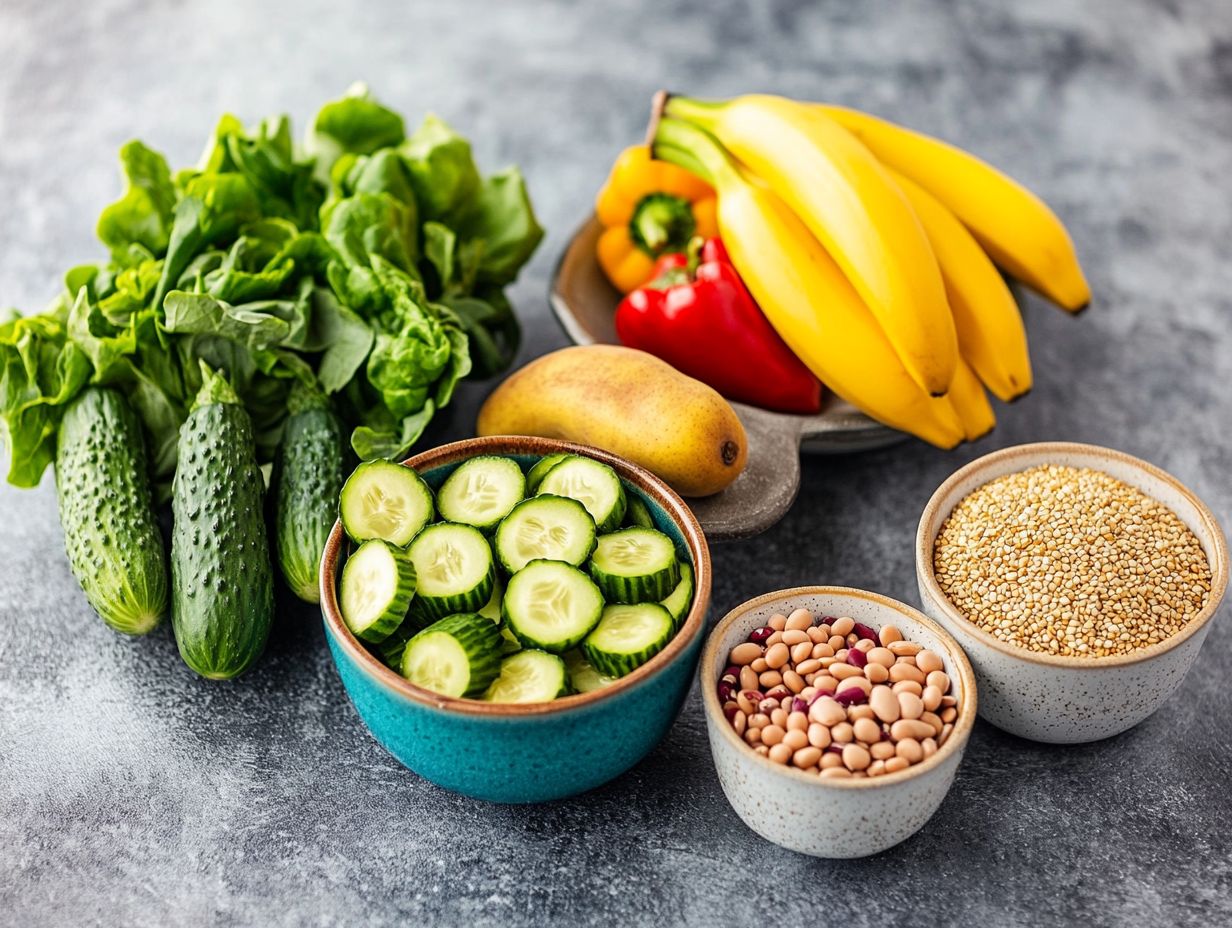
Artificial sweeteners are ingredients commonly found in many sugar-free and low-calorie foods. While they are calorie-free, they may negatively affect digestive health, causing bloating and gas in some individuals due to their difficulty in digestion and potential fermentation in the gut.
Many people are unaware that these sweeteners can lead to discomfort similar to that caused by gas-producing ingredients in other foods. There are several types of artificial sweeteners, each with distinct properties and roles in the food industry.
- Aspartame
- Sucralose
- Saccharin
are among the artificial sweeteners used to sweeten beverages, snacks, and desserts. Additionally, sugar alcohols such as sorbitol and erythritol serve as sugar substitutes in a wide range of food products.
For those who experience digestive discomfort, stevia and monk fruit may be more gut-friendly alternatives. These natural sweeteners are often better tolerated and have a lesser impact on gastrointestinal health, making them suitable options for individuals who enjoy sweetness but wish to avoid the discomfort associated with traditional sweeteners. Fermented foods like pickles and sauerkraut can also aid in reducing gastrointestinal discomfort.
5. Fatty Foods
Fatty foods can slow down digestion, leading to feelings of fullness and bloating, especially when consumed in large quantities. While healthy fats are essential components of a balanced vegan diet, both the type and amount of fat consumed can significantly impact digestive health.
It is crucial to be mindful of fat sources, as excessive intake of fatty foods, even from plant-based sources like nut butter, can result in unpleasant symptoms. Incorporating healthy fats from avocados, seeds, and olive oil provides essential fatty acids that promote heart health and contribute to overall wellness.
Conversely, highly processed oils or an overabundance of fried foods may cause digestive strain and increased bloating. For those following a vegan lifestyle, it is important to balance and choose healthier fat sources while monitoring portion sizes.
This approach will support optimal digestive function and enhance nutrient absorption and energy levels, demonstrating that moderation is key to maintaining a healthy gut. Experts like Barbara Bolen, PhD, and Robert Burakoff, MD, from Verywell Health, emphasize the importance of a balanced diet in managing digestive health.
How Can a Vegan Diet Help with Gas and Bloating?
A well-planned vegan diet can help reduce gas and bloating by incorporating non-gassy foods that are easier to digest and including beneficial components like fermented foods that enhance gut health. Fermented options like kefir, kimchi, and kombucha can play a significant role in promoting digestive wellness.
By replacing gassy foods with healthier alternatives, individuals can enjoy a diverse range of flavors while alleviating discomfort and promoting overall digestive health.
1. High Fiber Foods to Include
High-fiber foods, such as quinoa, brown rice, and certain fruits (when consumed in moderation), are excellent additions to a high-fiber vegan diet. These foods enhance digestive health without causing gas or bloating and provide essential nutrients that help regulate bowel movements.
Key high-fiber foods in a vegan diet include:
- Legumes: Lentils, chickpeas, and black beans are remarkable sources of fiber and can easily be incorporated into salads or soups to boost nutritional value.
- Vegetables: Broccoli, Brussels sprouts, and carrots are vital sources of daily fiber intake. Roasting or steaming these vegetables helps preserve their nutritional content and makes them easier to digest.
- Fruits: Berries, apples, and pears are tasty sources of fiber that can contribute to improved gut health.
Incorporating these high-fiber food options into meals can enhance digestion, increase nutrient absorption, and promote overall health, which is particularly important for those following a vegan diet.
2. Fermented Foods to Include
Incorporating fermented foods such as kefir, kombucha, and sauerkraut into a vegan diet is one of the best ways to promote good digestive health. These foods are rich in probiotics, which help create a balanced gut microbiome and alleviate symptoms like gas and bloating.
Probiotic-rich foods enhance digestion and minimize the digestive discomfort often associated with gas-inducing ingredients. Including these foods in daily meals can contribute to a healthy digestive system.
Kimchi is another excellent option, as it is packed not only with probiotics but also with a wide variety of vitamins. Tempeh, a lesser-known choice, is higher in protein than many other fermented foods and serves as a solid source of fermented protein, which supports overall gut function while being gentle on the stomach. Other fermented options like probiotic yoghurts and tumeric-laced beverages can also be beneficial.
Regular consumption of these items can improve nutrient absorption and enhance overall well-being while reducing gastrointestinal discomfort. This simple approach to promoting gut health can make mealtime more enjoyable and alleviate bloating.
3. Herbal Teas to Include
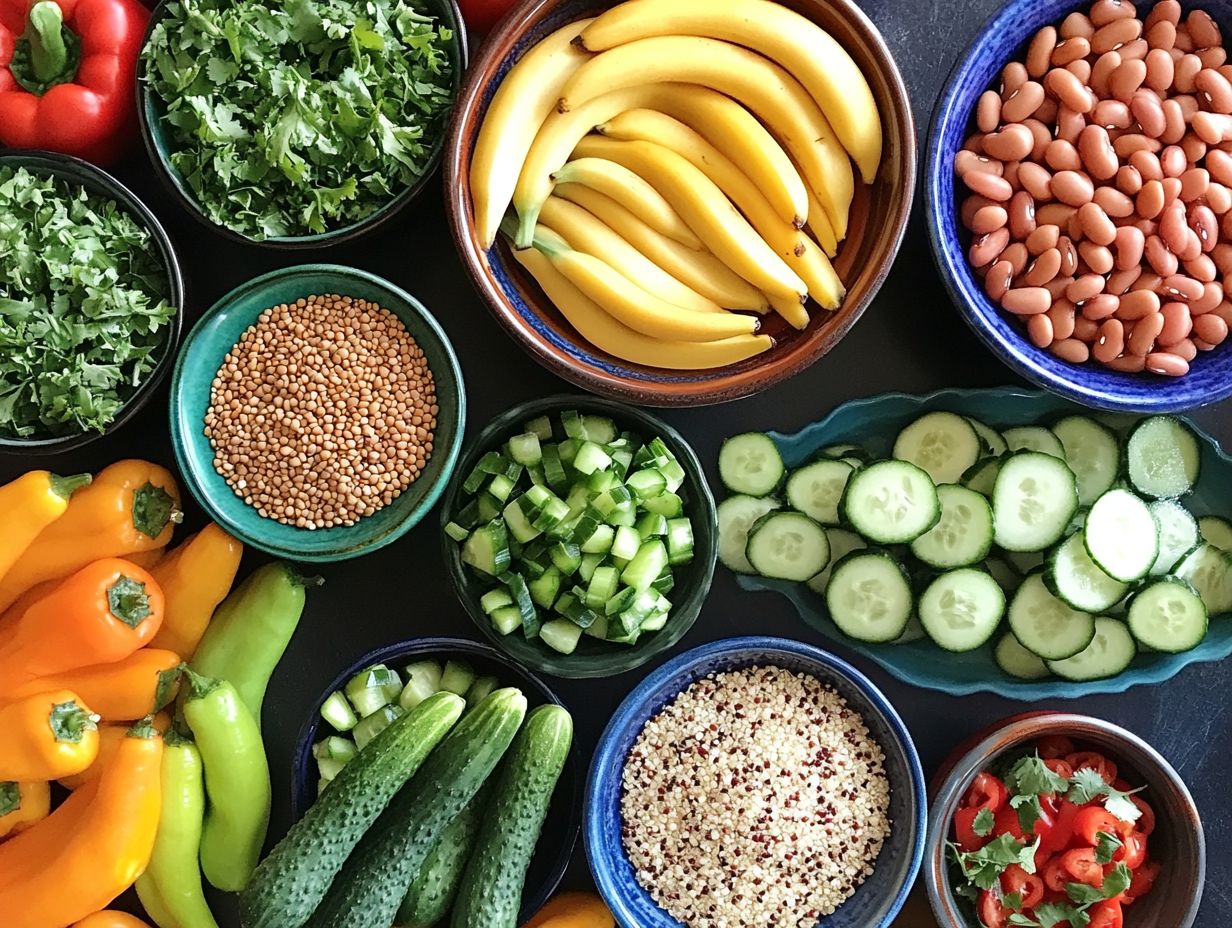
Herbal teas, such as ginger and peppermint tea, can be excellent additions to a vegan diet for individuals experiencing gas and bloating, as they possess natural properties that soothe the digestive tract and alleviate discomfort. These teas not only provide hydration but also promote digestive health by easing symptoms associated with gassy foods, potentially leading to reduced gas.
Incorporating these herbal infusions into daily routines is remarkably simple and beneficial. For example, enjoying a cup of ginger tea after meals can enhance digestion by stimulating the production of digestive enzymes, while peppermint tea serves as a mild laxative, helping to ease constipation and bloating.
To maximize their effects, individuals can habitually sip on these teas throughout the day, perhaps integrating them into post-lunch or evening rituals. Additionally, blending these teas with a squeeze of lemon or a touch of honey can enhance their flavor and further promote gut health, making it an enjoyable way to address digestive issues.
What Foods Should Be Avoided on a Vegan Diet for Gas and Bloating?
A vegan diet may contain certain foods that can lead to gas and bloating. Therefore, being aware of which foods to limit or avoid can significantly enhance overall digestive health by reducing the intake of gas-producing items.
For instance, foods that are high in sugar, high in starch, and those that cause discomfort—particularly for individuals with gluten sensitivity—should be monitored.
1. Cruciferous Vegetables to Avoid
Cruciferous vegetables offer numerous health benefits; however, they are also significant sources of gas-producing compounds, making them some of the worst foods for bloating.
Vegetables such as broccoli, cauliflower, and Brussels sprouts should be consumed with caution, as they can be quite irritating for some individuals. The gas and bloating often stem from their high fiber content and certain complex carbohydrates that some people find difficult to digest.
Additionally, cruciferous vegetables contain sulfur-containing compounds, which can exacerbate digestive issues in sensitive individuals.
If you wish to enjoy the nutritional advantages of cruciferous vegetables while avoiding unpleasant side effects, consider opting for alternatives like:
- Spinach
- Zucchini
- Bell peppers
These vegetables, along with options like quinoa and brown rice, provide many of the same vitamins and minerals found in cruciferous vegetables but are gentler on the digestive system, allowing you to maintain a healthy diet without discomfort.
2. Legumes to Avoid
Legumes are an important component of a vegan diet; however, certain types can negatively impact digestive health and may lead to increased bloating and gas, especially if they are not prepared properly. For individuals sensitive to gas-inducing foods, avoiding or limiting legumes such as beans and lentils can help alleviate these symptoms.
The issue often arises from the oligosaccharides present in these foods, which are challenging for the human digestive system to break down. If legumes, such as beans, are not adequately cooked and soaked, the indigestible fiber and sugars may ferment in the gut, causing discomfort.
Soaking, sprouting, or thoroughly cooking legumes can significantly mitigate these effects. Additionally, alternatives such as quinoa, chia seeds, or nutrient-rich nuts can offer similar benefits in protein and fiber without the gas-related issues, enabling individuals to maintain a balanced diet without unwanted side effects.
3. Processed Foods to Avoid
Processed foods often contain additives, artificial ingredients, and preservatives that can cause digestive issues such as bloating and gas, making them important to avoid on a vegan diet that promotes good digestion.
Many of these products are also high in sugar, high in starch, and unhealthy fats, which can further aggravate digestive discomfort. For instance, ingredients like high fructose corn syrup, artificial sweeteners, and trans fats are known to disrupt the gastrointestinal tract.
These substances can contribute to poor gut health and a decline in overall well-being due to their inflammatory nature and their potential to disturb the natural balance of gut bacteria.
In contrast, whole, unprocessed foods such as fruits, vegetables, legumes, and whole grains are rich in nutrients that support digestive health. A balanced vegan diet that emphasizes these foods ensures adequate fiber intake, which promotes digestion and reduces the risk of discomfort typically associated with processed foods.
4. Artificial Sweeteners to Avoid
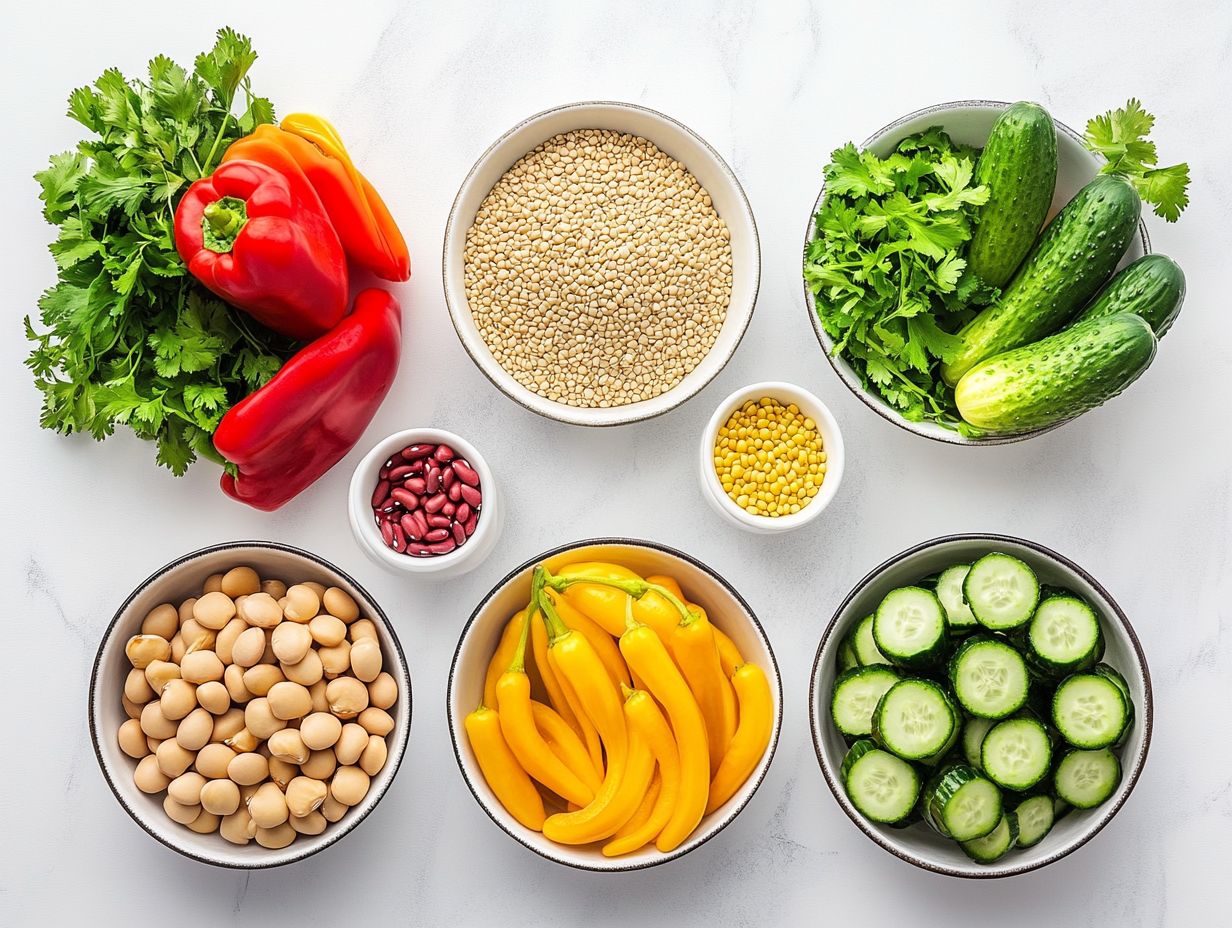
Several artificial sweeteners found in sugar-free foods can cause digestive issues, such as bloating and gas, and should be avoided by individuals who are sensitive to these problems. Ingredients like sorbitol and mannitol can ferment in the intestines, leading to increased gas production and affecting the balance of gut flora.
Some of these substances, commonly found in chewing gums and low-calorie foods, may also disrupt the delicate balance of gut bacteria, resulting in further digestive complications. Those looking to reduce their consumption of synthetic substitutes can opt for natural sweeteners that offer a pleasant taste while being suitable for a vegan diet.
For instance, stevia and monk fruit extract are excellent alternatives that provide sweetness without the gastrointestinal side effects associated with artificial sweeteners. Additionally, other natural options like maple syrup or agave nectar can be used in smaller amounts to enhance the flavor of dishes without straining the digestive system.
What Are Some Tips for Managing Gas and Bloating on a Vegan Diet?
Here are some practical tips for managing gas and bloating on a vegan diet:
- Keep a food diary to identify which foods cause gas.
- Eat smaller meals to support your digestive system.
- Pay attention to cooking methods that promote better digestion.
By making these choices, individuals can navigate their dietary options more effectively.
1. Chew Your Food Thoroughly
Chewing food thoroughly is a simple yet effective tip for promoting digestive health and reducing symptoms such as bloating. By breaking down food into smaller pieces, thorough chewing makes it easier for the body to digest and absorb nutrients. This practice can also prevent large food particles from fermenting too quickly in the gut, which can lead to gas. Additionally, well-chewed meals help release digestive enzymes, enhancing the digestive process from the outset.
Mindful eating, which involves savoring each bite and appreciating the various flavors, can significantly amplify these benefits. This approach encourages individuals to eat more slowly, thereby reducing the likelihood of overeating and allowing them to enjoy their meals more fully.
To incorporate mindful eating into daily routines, one can start by eliminating distractions during mealtime, such as screens or multitasking, and focusing on the aroma, texture, and taste of the food. Being present during meals can not only improve digestion but also foster a healthier relationship with food.
2. Drink Plenty of Water
Drinking water is essential for maintaining a healthy digestive system and can help reduce symptoms of bloating by promoting digestion and ensuring regular bowel movements.
Proper hydration aids in the breakdown of food and the elimination of waste from the body, which decreases the likelihood of gas accumulation. Additionally, adequate hydration helps maintain the mucosal lining of the intestines, which is crucial for nutrient absorption. This mucosal lining acts as a barrier against harmful toxins and bacteria, contributing to a healthier gut microbiome.
By drinking enough water, individuals enable their bodies to effectively process fiber-rich foods, allowing nutrients to function properly in the digestive tract. Consequently, well-hydrated individuals may experience less discomfort and heaviness associated with bloating.
3. Eat Smaller Meals
Eating smaller meals throughout the day, rather than larger ones, can enhance digestive health and reduce bloating and gas by preventing the stomach from becoming overly full, thus allowing for easier digestion.
This approach enables the body to break down food more efficiently, minimizing discomfort. In a vegan diet, this strategy is particularly beneficial, as many plant-based foods are high in fiber, which further supports healthy digestion.
Consuming five to six smaller meals that include fruits, vegetables, whole grains, and legumes can help individuals maintain their energy levels while promoting a healthy digestive system.
Simple snacks, such as hummus with carrot sticks or a smoothie made with spinach and banana, can aid in adhering to this eating pattern. Additionally, being mindful of portion sizes and thoroughly chewing food can further support the digestive process, ensuring that those following a vegan lifestyle can fully enjoy their meals.
4. Try Digestive Enzymes
Digestive enzymes can enhance a vegan diet by alleviating symptoms of gas and bloating. They achieve this by breaking down macromolecules in food that are difficult to digest, thereby improving nutrient absorption and reducing discomfort associated with gas-producing foods. Incorporating probiotics like kefir, kimchi, kombucha, and sauerkraut into your diet can also aid digestion.
Research published in the Journal of the College of General Practitioners indicates that the body produces a variety of digestive enzymes to assist in the breakdown of these macromolecules. However, when the body struggles to fully digest complex carbohydrates or fiber-rich foods, such as beans and broccoli, it can lead to excessive gas and bloating.
Digestive enzymes help by breaking down macromolecules into smaller components—proteins into amino acids, carbohydrates into simple sugars, and fats into fatty acids—promoting nutrient absorption and minimizing fermentation in the intestine. Foods like hard cheese, brown rice, and quinoa are also beneficial for a balanced diet.
Many individuals choose to increase their intake of these enzymes through supplements, which are widely available in health stores, or by incorporating enzyme-rich foods such as pineapple, papaya, and probiotic yoghurts into their diets. Both pineapple and papaya contain bromelain and papain, respectively, which are crucial for improved digestion and overall gut health.
5. Keep a Food Diary
A food diary is a valuable tool for tracking food intake and helping patients identify which foods may cause digestive discomfort, such as gas and bloating. This practice is particularly beneficial for individuals who may not recognize the connection between specific foods and their digestive issues until they see it documented. Notable experts in this field, such as Barbara Bolen, PhD, and Robert Burakoff, MD, recommend this practice for better digestive health.
To maximize effectiveness, a food diary should not only record the meals consumed but also include details about the ingredients and portion sizes. Additionally, noting the time of day each meal was eaten, as well as any drinks or snacks consumed in between, such as almond milk, coconut milk, or peanut butter, can provide further insights.
It is also important for individuals to document any symptoms experienced during this time, including their intensity and duration. Collecting this information allows for thorough analysis of the data later, which is crucial for identifying trends over time, such as reactions to sauerkraut, kefir, and kombucha.
By recognizing patterns—whether related to lactose, high sugar, high starch, or certain high-fiber foods—patients and healthcare providers can make informed dietary adjustments, ultimately leading to more consistent and improved digestive health.
